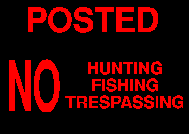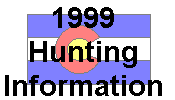Everything You Wanted to Know About Asking Permission But Were Afraid to Ask
***Reprinted from a Division of Wildlife Pamphlet.***
ABOUT THE WILDLIFE RESOURCE
Colorado is home to 960 different species of fish and wildlife (747 or which are nongame). Landowners play a key role in wildlife conservation because many of the species of wildlife we have today are dependent upon private land for their survival. Landowners are considered the keepers of much of our wildlife and should be treated with great respect is we wish to enjoy viewing, photographing, hunting and fishing for wildlife on their property.
Hunters and fishermen also play an important role in wildlife conservation through license fees. In fact, sportsmen have done more to aid and protect wildlife species than any other group in the country. License fees go to support the Colorado Division of Wildlife, which is responsible for managing the fish and wildlife resources for the people of this state. ALL fish and wildlife benefit from license fees. It is your hunting and fishing license money that is spent to improve fish and wildlife habitat, to manage game, to finance conservation education and to enforce conservation laws.
All of the people of Colorado have the opportunity to contribute to wildlife conservation through the nongame income tax check-off. This check-off supports the Endangered Wildlife program. The goals of this program are to protect our nongame wildlife, to reverse the decline of threatened and endangered species, to prevent other species from sliding into these categories and to encourage nonconsumptive uses of wildlife.
THE LAW
As stated in Colorado Revised Statute 33-6-123, "it is unlawful for any person to enter upon privately owned land or lands under the control of the State Board of Land Commissioners to take any wildlife by hunting, fishing or trapping without first obtaining permission from the owner or person in possession of the land." Please respect the property of others and "ASK FIRST" to hunt and fish on private property. A violation of this law could result in the loss of hunting, fishing, and trapping privileged for up to 3 years!
TIPS ON GAINING ACCESS TO PRIVATE LAND
67% of Colorado land is under private ownership. To assure access to this land, you must be considerate of the private landowner's needs.
Asking Permission
A personal visit to the landowner is usually more effective than a phone call. This allows the landowner to meet you and makes it much easier to gain permission.
Come prepared with a Colorado Courtesy Card available from the Division of Wildlife.
Ask permission in advance. Don't wait until the last minute!
Ask permission at a convenient time for the landowner. Right after lunch or early evening is a good time to catch the landowners when he is not so busy.
When you ask permission to hunt or fish, ask for specific time and day.
Go by yourself or with one other person when asking.
Don't look like a bum. The way you dress is important.
Don't make the mistake of asking to hunt where livestock is present.
Be a Gracious Guest
When access is granted, be sure you know where you can and can't go and any special rules the landowner may have.
Be sure to ask about the exact property lines.
Drive only on roads the landowner has designated.
Leave gates just as you found them.
Keep safely away from houses, barns and livestock, and respect the crops.
Ask the landowner for advice on how to hunt or fish the property.
Thank the landowner before you begin your hunt.
Always return the favor of permission with another favor.
Offer to share your game with the landowner (refer to donation regulation).
Offer assistance if you find a broken fence or gate.
Report and damage to fences or livestock you see - even if it isn't your doing.
Seeking Permission To Bring Your Dog
Don't let your dog out of the vehicle in the landowner's yard if other animals (dogs, cats, etc.) are present.
Don't take an unruly dog with you under any circumstances.
Demonstrate to the landowner that you can control your dog.
Exercise your dog before putting it into the car. This gives the dog a chance to release some of his energy, thus settling it down a bit.
Always Remember
The landowner who has given you permission to use the property does not mind if you bring a friend or tow along. But you may destroy your welcome if you arrive with a carload of companions.
Developing person-to-person relationships with the landowners is another key to having more private land available for wildlife recreation. Wildlife recreationists who get to know a landowner and who stop in after their stay are almost always welcomed back.
By treating the land as if it were your own, and by showing consideration and courtesy to the landowner and the property, a recreationist will always have a place to enjoy wildlife.
Don't arrive with a beer in your hand; landowners don't want potentially intoxicated people on their land.
Never forget that you are a guest on these lands and this is a privilege, not a right.
Your actions may be the determining factor on anyone else accessing these lands.
Be aware that in some areas gaining permission to hunt one particular species may be nearly impossible while gaining permission to hunt another species is often easy. For example, the landowner may not let you hunt deer on his property, but would let you call or trap coyotes.
Don't assume that permission granted one year means you automatically have permission to recreate in following years. Situations change and permission should be requested each year.
OUTDOOR ETHICS
The ethical wildlife recreationist always respects the land - whether private or public, and takes care to leave the land the way it was found. You will always find a clean camp, free of any trash, where an ethical wildlife recreationist has been.
The ethical wildlife recreationist appreciates the beauty of a herd of deer grazing in a forest meadow, undisturbed by its viewer, and never allows the dog to chase or harass wildlife. To observe and leave unnoticed is the way of the ethical wildlife recreationist.
Most hunter and fisherman obey the game laws, but that alone isn't enough. Without ethics, one can still be a licensed, law-abiding hunter or fisherman and still be a poor sportsman.
The ethical hunter knows the limits of both their gun and shooting ability, and always tries for a clean kill. Always make sure that your rifle is properly sighted in. In addition to the game laws, the ethical sportsman obeys ass laws when hunting or fishing, and acts as a goodwill ambassador of their sport and for all other hunters and fisherman.
The unethical hunter or fisherman, the taker, never gives companions an even break. They brag about successes when filling a limit and make excuses if they do not. They will hunt or fish on private property without permission and show no respect for the land on which they trespass. Concern is never for how they hunt or fish, only for how much game is bagged.
Conservation laws and hunting and fishing ethics are two sides of the same coin. Do away with either, and we will do away with hunting and fishing.
One who takes pride in their sport and themselves, treats their quarry with respect.
The ethical hunter and fisherman never takes more than the limit. More important still, never takes more game than can be used.





